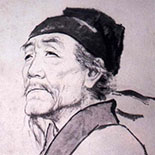 Du Fu (Tu Fu; Dù Fǔ; 712 – 770) was a prominent Chinese poet of the Tang dynasty.
Du Fu (Tu Fu; Dù Fǔ; 712 – 770) was a prominent Chinese poet of the Tang dynasty.
Along with Li Bai (Li Po), he is frequently called the greatest of the Chinese poets. His greatest ambition was to serve his country as a successful civil servant, but he proved unable to make the necessary accommodations. His life, like the whole country, was devastated by the An Lushan Rebellion of 755, and his last 15 years were a time of almost constant unrest.
Although initially he was little-known to other writers, his works came to be hugely influential in both Chinese and Japanese literary culture. Of his poetic writing, nearly fifteen hundred poems have been preserved over the ages. He has been called the “Poet-Historian” and the “Poet-Sage” by Chinese critics, while the range of his work has allowed him to be introduced to Western readers as “the Chinese Virgil, Horace, Ovid, Shakespeare, Milton, Burns, Wordsworth, Béranger, Hugo or Baudelaire”.
BALLAD OF AN ANCIENT CYPRESS
Du Fu
Before Kongming’s shrine stands an ancient cypress,
Its branches are like green bronze, its roots just like stone.
The frosted bark, slippery with rain, is forty spans around,
Its blackness blends into the sky two thousand feet above.
Master and servant have each already reached their time’s end,
The tree, however, still remains, receiving men’s devotion.
Clouds come and bring the air of Wuxia gorge’s vastness,
The moon comes out, along with the cold of snowy mountain whiteness.
I think back to the winding road, east of Brocade Pavilion,
Where the military master and his lord of old share a hidden temple.
Towering that trunk, those branches, on the ancient plain,
Hidden paintings, red and black, doors and windows empty.
Spreading wide, coiling down, though it holds the earth,
In the dim and distant heights are many violent winds.
That which gives it its support must be heaven’s strength,
The reason for its uprightness, the creator’s skill.
If a great hall should teeter, wanting rafters and beams,
Ten thousand oxen would turn their heads towards its mountain’s weight.
Its potential unrevealed, the world’s already amazed,
Nothing would stop it being felled, but what man could handle it?
Its bitter heart cannot avoid the entry of the ants,
Its fragrant leaves have always given shelter to the phoenix.
Ambitious scholars, reclusive hermits- neither needs to sigh;
Always it’s the greatest timber that’s hardest to put to use.
========
JADE FLOWER PALACE
Du Fu
The stream swirls The wind moans in
The pines. Gray rats scurry over
Broken tiles What prince, long ago,
Built this palace, standing in
Ruins beside the cliffs? There are
Green ghost fires in the black rooms.
The shattered pavements are all
Washed away Ten thousand organ
Pipes whistle and roar. The storm
Scatters the red autumn leaves.
His dancing girls are yellow dust.
Their painted cheeks have crumbled
Away His gold chariots
And courtiers are gone. Only
A stone horse is left of his
Glory I sit on the grass and
Start a poem, but the pathos of
It overcomes me. The future
Slips imperceptibly away
Who can say what the years will bring?
========
THE TIED-UP CHICKENS
Du Fu
My little servant bound the chickens
ready to take them to market
of course they didn’t like that
they flapped, cackled, struggled
my family doesn’t like to see
chickens devour worms and bugs
but they ought to realize
the chickens will be boiled
should human beings take sides
between the bugs and chickens?
I call out to the servant,
“Untie them, let them run free!”
Chickens or bugs, gains and losses —
it’s never going to be settled,
I think as I lean on this hilltop house
and gaze at the cold river.